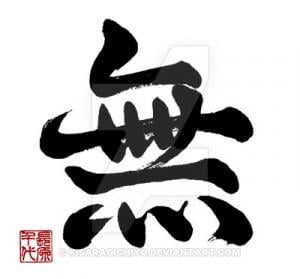My friend and mentor the Zen priest and scholar Glenn Taylor Webb, Kangan Osho, just shared this note with me. Professor Webb studied the academic side of Zen with D.T. Suzuki, Hisamatsu Shin’inchi, Masao Abe, and many others. While at the same time delving into the practices of Rinzai and Obaku, eventually being ordained by the Obaku master Miyauchi Kanko Roshi. This note digs into the the critical Zen term “Mu” in ways I find helpful. I hope you will agree. Reprinted with permission…
Dear James,
May I attempt an insider’s Japanese Zen lesson about language? The term muri (無理) that I used in a recent Facebook response to your laudable effort to set up a new Zen group is interesting. Mu means “no” as the opposite of “yes.” Ri literally means principle, reason or sense. So, “no sense” or “nonsense” might be the working translation of this two-character Chinese term.
With the verb suru (する) “to do” after those two characters, the meaning becomes “to do nonsense” (or more smoothly, “to do something unreasonable.”) But if the same verb is used in its negative form, shinai (しない), the meaning then becomes “to not do nonsense,” i.e., anything unreasonable. If the verb is further declined with yo ni (ように), the same phrase means “to not do anything approaching nonsense” (or anything unprincipled, unreasonable, etc.). In ordinary conversation today, the phrase mu-ri shinai yo ni indicates you are telling someone (or you are being told by someone) not to attempt the impossible. (That’s what I offered as my advice to you on Facebook.)
So far so good. This simple term mu-ri can be used many ways in Japanese. For example, mu-ri oshi suru inserts the word oshi (押し) or “push” and changes the meaning slightly: “to not push no sense” (or insist on the unreasonable.) It would be used in a complicated sentence this way: “I think the U.S. is pushing Japan too hard on this issue” (この問題に関してアメリカは日本に対し無理押しの感がある.)
In other situations the meaning of mu-ri can change to another of its meanings in English, as in a statement such as “when force is used, reason vanishes” (無理が通れば道理が引っ込む.) In this case, mu-ri is unprincipled nonsense to the extent of being a (bad) force! The good guy in this struggle has a stronger word for reason — one that draws on the laws (the Way, the Dao) of nature itself (J. do-ri 道理).
無
This brings me to the Zen use of the Chinese character in question here, the one pronounced Moo in Japan and Woo in China. I sometimes get testy with students who demand that it refers to the nothingness of Zen. Au contraire mon ami! Help from old Bodhidharma himself is on the way! For he said, “Honrai muichibutsu!” (本来無一物.) Now be careful about translating that into literal English to mean, “Fundamentally not one thing” or “there is only nothingness.” One of my students excitedly suggested that in as much as the words for “Buddha” and “thing” are both pronounced “butsu” in Japanese, maybe we are to understand that nothingness and Buddhahood are the same. But the two words are written with different Chinese characters (仏、物), so he was wrong. Nevertheless, maybe the idea of “fundamentally, no-one-thing-ness” is closer to the mark than anything else in English when it comes to getting what the founder of Zen Buddhism put so enigmatically.
As my favorite old Buddhist dictionary puts it, 有無を超えた絶対の無のことである。”This MU goes beyond ‘is’ and ‘is not’ to a place beyond all dualities, to being as it fundamentally is.” In that sense, Bodhidharma’s words, while still puzzling, may proclaim that “Not-one-thingness is Thusness.” Indeed, scriptures speak of tathagata (J. nyorai 如来) as thus-come-ones, as Buddhas. The founder of the Zen denomination in Chinese Buddhism was not referring to himself as a Buddha; nor was he excluding himself as such. Neither was he including or excluding the historical Buddha in the statement.
Here’s the point: enlightenment (Buddhahood) is not one person or thing or the other. nor is it only found in one particular place or state of awareness. It is all births, all deaths, all existence. In fact, “it’s me” (or as my father taught me to say, “It is I.”) Finally, perhaps the lesson of the Mu of Zen is that the pronouns me, my and mine are unlimited, unreasonable, and ultimately, in truth, nonsense. Or better yet, with a change of pronoun to the plural, perhaps it is teaching us that “We are the world.”
***













